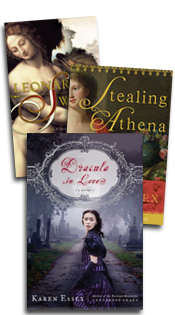Also posted on Vintage/Anchor Books. Click
here to check out their site.
In their respective novels The Gargoyle and Stealing Athena, Andrew Davidson and Karen Essex both tell parallel stories that take place in two different time periods, intertwining the lives of people separated by centuries. The books also explore common themes of the mystical, the mythic, karmic debt, the creation of art, and romantic love. In a candid and uncensored phone conversation, the authors compare their writing processes and talk about the sometimes numinous, sometimes laborious procedure by which they create stories and bring their characters to life.
(Click here to listen to entire conversation: )
KE: Hi Andrew. When I wrote to you I said that Doubleday had sent me a galley of The Gargoyle before it was published and I read it…
AD: Right.
KE: … and I really enjoyed it…
AD: Ah, thank you.
KE: When Anchor asked me to participate in this dialogue, even though I am on a deadline, and I am rather far behind at this point, I was going to skim The Gargoyle again, but the truth is that I have now re-read every word of it, because I was just enjoying it way too much.
AD: Well, I apologize.
KE: So if I’m late on my deadline, I’m just going to say call Andrew Davidson, it’s all his fault.
AD: I think that’s a very wise… blame me, that’s the way to go.
KE: Uh huh, I will.
AD: Okay, good. Before we get into the question, what’s the deadline? Do you have another novel coming out? Or is it an article of some sort?
KE: I’m here in London, writing my next novel, which is a Victorian gothic novel, and it’s due in November.
AD: Okay, we’re going to come back to the question that you’re just about to get to, but my question to you before we get to that question is: how are you so unbelievably prolific? Because I just finished reading Stealing Athena, which was great, by the way…
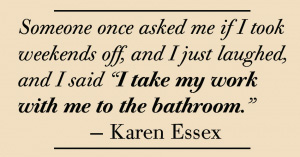
KE: Thank you.
AD: … and there’s a lot of words in it. How did you get another book out of your body so quickly?
KE: I am remarkably unblocked in most situations, though Stealing Athena was the hardest thing I ever wrote.
AD: Why was that?
KE: Well, it was because of the enormous amount of historical research that I had to assimilate, and then spit out into a narrative that didn’t sound like a history lesson.
AD: But still, Stealing Athena was only two years after the book that came before it, is that correct?
KE: Right.
AD: Wow. I’m sorry to get on this….
KE: Quite all right.
AD: But seriously I am in awe. I just don’t know how you can write that much.
KE: I’m not sure how to answer that question, because people always ask me what my process is, and I always say my method is the obsessive-compulsive method of writing. Which is, that once I get going on something, I almost don’t let it go. In a weird way. Someone once asked me if I took weekends off, and I just laughed, and I said, “I take my work with me to the bathroom.”
AD: Right.
KE: And I wasn’t kidding. I’m trying to correct these measures now, but….
AD: The interesting thing is that I write, I think, by that obsessive-compulsive method a bit as well, but what it ends up doing for me is dragging me off down alleyways that are incredibly fascinating, and I write twenty or thirty pages about, but I discover that it ends up being one paragraph in the finished work.
KE: Right. Well, The Gargoyle was your first novel. Correct?
AD: That’s right. Yes.
KE: And you wrote it without a deadline.
AD: Without any deadline whatsoever.
KE: Right. So I had the same experience. My first novel was Kleopatra, it took me about… it took me seven years from the time I thought about it and began to research it to the day I sold it, to what was then Warner Books. So… and I did a lot of research that took me down fascinating alleyways, which had nothing to do, in the end, with the finished book. But I’m here to inform you that now that you’re a big success…
AD: Yeahhh….
KE: … you’re going to have to learn to write faster. And you will.
AD: Okay.
KE: My experience has been that you now have a readership, and your readership is waiting for you.
AD: Right. But….
KE: So….
AD: …my feeling in my case is that, umm, I mean I’m certain that I could put something out in two years, but I don’t know if my readership would be happy with it, because I know I wouldn’t be.
KE: Right.
AD: Yeah.
KE: Yeah, this is… I think this is one of the issues that we novelists deal with, and I… This is what separates what I would call, for lack of a better word, a “career novelist”…
AD: Right.
KE: … you know, from someone who has a story or two in them. I think that it takes a brain-shift, almost, to transform oneself into a person who can write to satisfy a readership. And I don’t mean that that’s the primary goal, that we should be feeding product to our readers, but I look at people who are writing thick, idea-driven books like Philip Roth, and John Updike, and the late Iris Murdoch—these are all incredibly prolific people.
AD: Really, really are.
KE: So at some point I think they made that shift. And I think that you’re at the beginning now, so I bet you that if we had this conversation in five years into the future, you wouldn’t be so concerned about it.
AD: Well, you know, I think it’s interesting. Because I don’t think it’s necessarily—I completely understand what you’re saying, first of all—but I don’t necessarily know that it’s exactly what you’re talking about, as much as it’s just the different ways that people create. For example, I mean, in music, you’ve got, say, Leonard Cohen versus Bob Dylan. And at some point Bob Dylan was putting out an album every fifteen minutes, and Leonard Cohen puts one out every four years if we’re lucky.
KE: Um hmm.
AD: And that’s just how they approach it. And… recently, I’ve been going through the work of John Fowles. And I…
KE: Oh yes!
| AD: … and I’m absolutely loving his writing, and the books are so different, and he, I think, produced only seven novels in his life. Well, I mean clearly, here’s a “career novelist” who is just not somebody who writes in quite that quick way. And it’s not better or worse, obviously. The one thing I’ve discovered in |
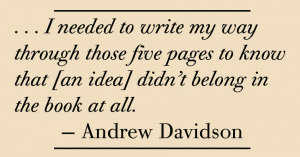 |
| this last year and a half, where I’ve actually been meeting professional writers, because I didn’t know anybody before that, is just that everybody works in ways that absolutely surprise me. When I talk to other writers and they say, “Well, this is my method, this is my process,” sometimes it’s all I can do to keep from blurting out: “REALLY? That works for you?” |
KE: I think my favorite weird process story is that of Graham Greene, who got up early every morning, put on a beautiful suit, wrote exactly five hundred words, would stop mid-sentence, once he had reached his five hundred words, was often done by breakfast time, and then would go sort of be a social butterfly, go and hang out with his wealthy friends on yachts in the Mediterranean.
AD: Which is not a bad process at all.
KE: No. Why can’t I learn that one?
AD: Yeah.
KE: I don’t really see it forthcoming, but that’s the process I would most like to learn.
AD: And why can’t I learn it, either? Interestingly, in Stealing Athena, there’s—you talk about the “daimon,” the indwelling spirit inside people…
KE: Uh huh….
AD: At one point during the writing The Gargoyle, I wrote a five-page tangent on the history of the word “daimon,” which obviously never made it in. In the finished version of The Gargoyle, the word gets referenced once. I needed to write my way through those five pages to know that it didn’t belong in the book at all.
KE: Um hmm. No, I can see that, and I—but I do think that the more that you experience the form of the novel, the more proficient you will be at not needing to go down those roads.
AD: Well, you know, we’ll have to have a conversation in five years and see if I’ve learned anything. (Both laugh.) All right, so let’s go back, I think I interrupted you mid-question, about five and half minutes ago, maybe a little more….
KE: Yes. Well, now that you’ve said that you don’t want to talk about personal things, I’m going to just pretend you didn’t say that and I’m going to ask you, if—because your book is so vivid—I’m going to ask you if you were ever, like your character, either a pornographer, or a burn victim, or a substance abuser.
AD: No, no, and no. All imagination and research. Not a substance abuser as far as drugs. When I was younger I drank far too much, and I haven’t had a drink in, I don’t know, seventeen years, at this point. Which was a very good choice for me to make, but no I was never a drug addict. It was just a matter of following what I needed to know for these characters, and I—it’s funny, because I do get people who are surprised when they meet me and find out that I’m not burned. Which is interesting.
KE: I asked the question, but I would have certainly guessed that that was the least likely. I would have thought you were a pornographer, frankly, more than a burn victim. Because your—I could just tell—your research on burn victims was so amazing. And frankly, I’m not sure that a person could live through that and want to write about it in as vivid a way that you wrote about it. I think sometimes that our personal experiences are—I know that I write about the long-dead, so it’s hard for people to confuse me with my characters.
AD: You’re not Pericles? Because I was wondering.
KE: Well, no, I’ll tell you a little joke, and I’m sure that at this point you’ve gotten your share of strange readers. People always think that—there’s a certain breed of reader that imagines that I was Kleopatra in another lifetime, and so I’m always being asked this question: “Were you Kleopatra in another lifetime?” and I always laugh and say that I certainly wasn’t, but I’m pretty sure that I was Julius Caesar.
AD: Okay.
KE: Which leads me to my next question. Because you have said that the genesis of your book was that Marianne Engel started to talk to you.
AD: And you wrote back to me that Julius Caesar spoke to you.
KE: Is Marianne Engel an historical figure?
AD: No, absolutely not. When I go back to medieval Germany, and spend time in Engelthal monastery, she is one of the only characters who I didn’t have at least some indication existed. Ah, now I mean, you know from writing historical fiction and taking characters who exist, like, sometimes you’re only given a grain, a nugget, and then you just go a little bit crazy with what you say about it. I mean, for example, Christina Ebner who is one of the characters in medieval Germany, in the monastery… I have no idea what she actually looked like. None whatsoever, but I’ve got to describe her so you just kind of make stuff up and hope that she doesn’t come back from the dead to exact her revenge.
KE: So you’re—did you—let me ask you this: Did you know about the monastery before this character began to talk to you, or did you start doing research about thirteenth century Germany and then this character began to emerge?
AD: Neither. What actually happened in this case is I had—Marianne Engel came, started speaking to me, and essentially what happened is that she… I mean, she looked like she does in the book, and she was talking to me and she sounded somewhat mentally unbalanced, but I was pretty sure that she wasn’t. And there was a real religious aspect to the way that she spoke, and I found something old-fashioned about it, as well. And at one point when I put her in a room with the narrator of the book, the burn victim, she said, “We’ve known each other for seven hundred years,” but I really—at this point, I had no idea what she was talking about. And I had been working on the book for at least a year before I came across Engelthal monastery in completely unrelated pleasure reading, and I followed that line just because it interested me. I mean, in this case it was as simple as going “Well, her name is Marianne Engel and the name of this monastery is Engelthal”—Valley of the Angels—and I just wanted to see if there might be some connection, and there absolutely was, and when I went back and spoke to my character—because I do speak to my characters—I said, “When you were talking about living in the past, were you at Engelthal?” And she said yes. Is that…?
KE: That is fascinating.
AD: Okay, so that’s not just weird?
KE: It’s… it’s… super weird. (Both laugh.) It’s extraordinary, but I can follow it, and I do understand how these things happen. As I said, I was spoken to by this voice. I was writing, I had just begun to write my Kleopatra book, and the entire book was going to be third-person limited, so I was going to be writing in the third person, but always, always, in Kleopatra’s mind and voice, and from her point of view. And one day I was sitting at the computer and this very officious voice just started talking to me. And I couldn’t imagine what was happening, and he wouldn’t go away, and he wouldn’t go away, and what he was saying was very clever and I thought, well I better start writing some of this down, because this is so interesting. And I was, I don’t know, way into it—you know, way into it—when I realized this was the voice of Julius Caesar. And he was insisting that I give him the opportunity to talk about how he met Kleopatra, and write about her from his point of view. And I couldn’t stop it. I mean, it came to me as fully formed prose.
AD: Hm
KE: And you know it’s very, it’s very difficult to get fully formed prose. I don’t know if our readers understand how many drafts we go through, to get to something that they want to read.
AD: Literally—for anybody who is listening—literally, hundreds of drafts.
KE: Yes, for me too.
AD: Yeah.
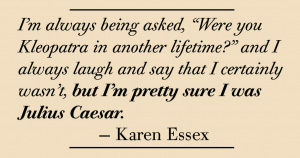 KE: Hundreds. I mean, it’s extraordinary how many times that you can over a sentence, and find ways to make it better, or more specific, clearer, a better image comes to you. You realize that the grammar is all wrong, and then you realize you don’t need the sentence, and then you continue on, and then you realize that sentence is missing and you have to put it back, and reintegrate it. So it’s just—you know, it’s a very painstaking process.
KE: Hundreds. I mean, it’s extraordinary how many times that you can over a sentence, and find ways to make it better, or more specific, clearer, a better image comes to you. You realize that the grammar is all wrong, and then you realize you don’t need the sentence, and then you continue on, and then you realize that sentence is missing and you have to put it back, and reintegrate it. So it’s just—you know, it’s a very painstaking process.
AD: Yeah, absolutely. I’m just going to say—like, to give an example of what we’re talking about is when you and I were both approached about doing this interview originally it was supposed to be a written interview, right?
KE: Right.
AD: And I came back to you, and I said, “Well, listen, I just don’t think I’ve got a written interview in me.” And for me the reason was, because, man, when I speak I can speak and I can get it out of me, but writing takes forever. Recently I’ve just been doing reviews and I’ve got a review coming out in of another writer’s book in a newspaper and it took me at least 30 hours of writing to write 450 words.
KE: Oh, that’s painful.
AD: It is. And I don’t know any other way to do it, because my review was originally ten pages long.
KE: Um hmm.
AD: And it took me all that time—it’s like that old joke: “I would have written you a shorter letter, but I didn’t have time.” Like, that explains writing to me.
KE: Yes, but how do we explain—and now you and I are both faced with this responsibility—how do we explain these characters getting in touch with us, and talking to us? I was telling this man I’ve been dating over the weekend about this process and I realize I sound utterly mad.
AD: Hmmm.
KE: So…
AD: Is that maybe the explanation?
KE: That may be one explanation. Your character is of your imagination. You created her.
AD: I actually worry a lot of the time that she created me. But okay, we’ll go with your hypothesis.
KE: So, somehow you created each other. But in linear time, you came first.
AD: Okay.
KE: But we don’t know that, because she’s a voice from the thirteenth century…
AD: Man, it’s all so tricky, isn’t it? And when did Julius Caesar give birth to you, exactly?
KE: I think it was in 1995. But he—you know, I have to wonder sometimes—and at the risk of sounding even more like a freak—was Julius Caesar trying to contact me? I have a dear friend who is a spiritualist—she’s, you know, she talks to people’s angels for them. And she says, “Yes, absolutely, you know. Julius Caesar is trying to contact you, and speak through you.” And you know, I find that hard—I find that even though I’m a person open to the paranormal—I find that difficult to wrap my brain around. And yet, it’s hard to find another way to explain what happens to us in this process of writing.
AD: Hmm.
KE: And what’s interesting is you, you know, you describe the process that we go through, is very similar to the process that your character Marianne Engel went through to create her gargoyles.
AD: Start with a lot and remove until you find the form.
KE: Um hmm.
AD: Right.
KE: And she was being spoken to by three masters, who were also telling her what to do.
AD: And they were actual historical figures. And interestingly, you know, we were talking earlier about the sort of way that the connections are made, is that one of the other historical figures in the book—in English, he’s called Henry Suso; in German, he’s called Heinrich Seuse—was a mystic theologian of the time. He had three masters that spoke to him in his head. And that came from him, over to Marianne Engel. So, I’m willing to steal from anybody.
KE: Well, you know the expression, they always say: new writers imitate, but experienced writers steal.
AD: Right. And as I understand, I think that it was T.S. Eliot who said that, but if I’m not mistaken he stole it from Picasso.
KE: And Picasso was a notorious thief of all kinds of things, so who knows where he got it.
AD: He heard it in the bar. But it—I find it very interesting the way we do meet characters because not all of my characters come and start talking to me. This was a very specific experience with my character Marianne Engel. But sometimes it’s an entirely different path to meet a character and sometimes it’s torturous. There’s so much work you do before they’ll say anything to you.
KE: Um hmm. Well did your protagonist… you don’t ever give him a name. Correct?
AD: Because he never gave me a name. I kept asking him; he wouldn’t tell me.
KE: So he preferred to remain anonymous, and you have to respect that.
AD: And I tried to give him names. You know, I’m not even going to say which names I gave him, but I tried for about a year to call him by a name, and it just didn’t work. It didn’t stick.
KE: I love that. Because in retrospect, once things have manifested the way they’re going to manifest. So here we have your protagonist who has no name. You gave him no name because he would give you no name, and yet there’s a perfection to it. When I think of trying to call that character a name, I can’t do it.
AD: Right.
KE: And it’s really—you know, so there’s a perfection in the way it turned out.
AD: And one of the reasons too, is, that in the story, it happens over and over, that as people enter a new life, they leave behind the name that they had previously.
KE: Mmm. Oh, that’s very true, and that’s perfect, because it’s almost as if—he has lost so much of his identity, in being burned.
AD: And not always in a bad way
KE: No, certainly. I mean, he lost his physical beauty. But losing his physical beauty enabled him to start learning to love, so you can’t really qualify that as bad. Even he says it’s the best thing that ever happened to him. But so much of his identity was burned away, and then I think the evidence of who he was… like, his driver’s license would have been burned away, and he says he won’t have access to his bank accounts anymore….
AD: But he still has a bank account that is set up in a false name…
KE: In a false name.
AD: …that he can still access. That he was using to hide proceeds from his pornography business.
KE: Right. So he—that’s what I’m saying. There’s just a perfection in him not having a name, and he doesn’t—actually, he’s not even located geographically.
AD: Right. And again this was sort of a combination of, well, not really being told when I was asking the characters, but it also wasn’t important. And in fact, I thought it was important to not set it in an actual location.
| KE: Hmm. |
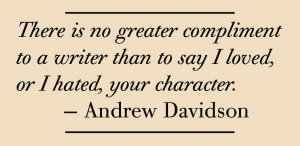 |
| AD: Which is not something that, obviously, you can’t do in your books. You have very specific locations. |
| KE: If you’re going to write about Pericles, you know he’s in Athens. |
AD: He’s not in downtown L.A.
KE: I don’t have to worry about those particular issues.
AD: Now, but do you find that constraining, or freeing? To have that information laid out for you?
KE: Both.
AD: Okay. Elaborate!
KE: It’s very interesting. I find it both constraining and freeing. It’s freeing because I don’t have to decide where Pericles lived, or where Aspasia, my other heroine, where she came from. In writing Stealing Athena, I was lucky enough to be able to read the letters of Lady Elgin, and so her personality came through loud and clear. And, you know, if it was 1799 and she was pregnant, well, she’s pregnant in 1799 in my book too. So it’s freeing in that it gives one less to invent, but then its also constraining in that it gives one less to invent.
AD: Right.
KE: And sometimes, you know, our lives don’t really unfold all the time in a way that is convenient for a narrative. So the challenge in writing historically based fiction is to take what really happened and without sacrificing history, and without just making things up, or ill-using history or historical characters, you have to figure out how to tell a story with a narrative out of a life that didn’t really unfold as one.
AD: Hmm.
KE: So that’s the challenging part.
AD: And how much license do you give yourself to make up details that you’re quite sure aren’t true, and do you worry about, for lack of a better word, “disrespecting” the life of the story, or the story of the life that you’re telling?
KE: I worry about that all the time and I don’t make up anything that I know isn’t true. I never do that. I did it once, in a very small way, and I got caught by a classical studies scholar who gave my second Kleopatra book, Pharaoh, an absolutely brilliant review, except she said: “She distorted the historical fact in this way, and it really bothered me.” And so I never did it again. I did it once, I knew I was doing it, I think I got tired of obeying my own rules, and so I broke my rule. But I don’t—if there is a truth available to me, I always use it. And then, if I’m inventing things, I make sure they are possible and hopefully probable.
AD: Okay.
KE: So I would never—so let’s say that Cicero was banished from Rome in 58 B.C., or whatever, I wouldn’t have him appearing in Rome in that year even if it was dramatically convenient for me.
AD: Hmm. Okay.
KE: So I don’t mess with the facts. And I have a great respect for these people who, ah, without knowing it have let me use their lives. I really do, I always try to—even in a case when they’re just absolute bastards like Lord Elgin, I always try to give a character his or her humanity and dignity.
AD: You know, I’ve got to say, talking about Lord Elgin, boy, did I have a reaction to that character. Boy, did I hate him. And I mean that in the best possible way. There is no greater compliment to a writer than to say I loved, or I hated, your character.
KE: Yes. And would you believe I worked hard to actually make him more human than he, I think, was.
AD: Really? Because every time a millimeter of his nose fell off, I was cheering and hoping that it would spread further throughout his body.
KE: He did terrible things, umm, certainly he did terrible things to his wife. But I didn’t want to write an out-and-out villain. Because, you know, I try not to make value judgments on my characters….
AD: Oh, you never can.
KE: People are always—people think that I manipulated that story to make Lord Elgin worse than he was so that I could make his wife some sort of martyr, but neither of those things is true at all.
AD: It’s interesting—I’m going to interrupt for a second—when you’re talking about not making value judgments on your characters, I mean, in writing that’s absolutely essential and I imagine that every time you’re writing something that Lord Elgin is doing, you’re looking at it from his side where he honestly believes he is doing the best possible thing.
KE: I certainly worked that way with him…
AD: Right.
KE: …and I hope that even though I fully exposed all the dastardly things that he did to his wife, and also the fact that he was certainly acting with the arrogance of empire in taking the Elgin marbles, and he was acting out of ego because he was directly competing with Napoleon…
AD: Right.
KE: …I also hope that I demonstrated that he did have the spirit of a preservationist…
AD: Right.
KE: … and that when he saw the degraded state of the Parthenon, it bothered him, and there was a part of him that thought: I am the man who can save this. I can save these beautiful treasures.
AD: And it’s worth saving, and if I get the credit, all the better.
KE: Yes.
AD: Right. And it’s interesting when you’re talking about Mary being a martyr, because, you know, I didn’t necessarily read it that way. At the same time that I’m hoping that more of Lord Elgin’s nose falls off, I’m also thinking, well, why does she keep putting up with this and how is she constantly tricked by him, why doesn’t she open her eyes and see what’s actually happening?
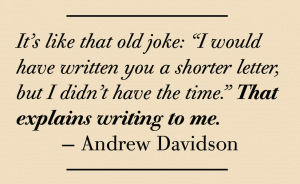 |
KE: She does see, but I think it’s so difficult for us in our twenty-first century perspective to understand what it was like to be a woman and a wife in the late 1700s, early 1800s. Women had no legal standing, and one simply did not just leave one’s husband. Mary thought that it was her job to do whatever it was she had to do to help make her husband the |
| great man that Destiny intended him to be. |
AD: Right.
KE: And for a very long time, she loved him and she acted in that spirit, until it became completely intolerable. And then she rebelled. But then, even after she rebelled, she was still willing to stay with him. You know, it was Elgin who took the final steps to end the marriage.
AD: Right. I’m just thinking that if I was Mary and Elgin was locked away in France, I don’t know that I would have been crusading quite as hard as she was to get him out.
KE: I know. And look at—not only did he not reward her for it, he accused her falsely of doing terrible things, while she was doing nothing but trying to help him get out of prison. I don’t see her as a martyr, either, by the way, and I’m glad you didn’t read it that way. I think she was someone who—I admire the way that even after many terrible things happened to her, she still went on, and still lived a good life, and a fulfilling and productive life. And in many ways, a joyful life, and found meaning in her life. Even though he tried his best to utterly destroy her.
AD: Yeah, it really did seem to be a case of Lord Elgin’s punishment in life was having to live with the fact that he was Lord Elgin.
KE: Yeah, can you believe some poor woman came along afterwards and had eight more children with him?
AD: You know, when I read that in the afterward I was thinking: “What? Really?” But he must have been…
KE: I know, it’s shocking.
AD: …he must have been a very charming man when he put his mind to it.
KE: Yes, and I think there was something about that four-letter word “Lord” in front of his name, gave him a certain amount of privileges.
AD: Umm hmm.
KE: But you know, we still haven’t answered my question, and we may never answer my question, which is: how can we explain that figments of our own imagination rise up, and contact us, and have psyches that are separate from our own to the extent that they start bossing us around?
AD: I’m weak-willed. Is that the answer? I don’t know. Like, I mean, I suppose we could guess, or put out our hypothesis, but I don’t really have an answer. All I am is glad that it does happen, and happy to write it down when it is occurring.
KE: So you are a person—as am I—who is happy to accept the mystery of it?
AD: Yeah. It’s not always so mysterious to me. Marianne Engel did come to me in an entirely mysterious way, present herself more-or-less fully formed, and talked to me. But for me that’s the exception rather than the rule. I mean, a lot of time I do so much background research on a character—character sketches, diary entries, letters they wrote, umm, drawings of what they look like, decisions on what type of clothing they will wear—that eventually I coax a persona out of the research.
KE: What’s so interesting to me is we go through the exact same research process, but you’re researching a fictional character, so your facts are coming from research and really from your own mind, and I’m going through the same process but I’m researching the actual facts about an historical figure who existed.
AD: Right, so you’re reading…
KE: But we’re still going through…
AD: You’re reading the actual letters of Mary…
KE: Yes.
AD: …whereas I would read those letters, too, but I’d also have to write them.
KE: Right, right. Yeah, that is fascinating, and I think that’s an interesting point for readers. I know—I also write screenplays, and I do those same exercises when I’m working on screen characters, you know, I write biographies for them, and maybe will write a letter in their voice, and that sort of thing, and imagine what their school experiences were like. And that’s—those are just the nuts and bolts of creating a character, right?
AD: Right.
KE: I think people don’t really understand that, that there is this birthing process.
AD: I think that what would really surprise people is just the enormous amount of work and research that—even as we’re doing it—we just know it’s never going to make it into the final book. It’s what we have to know, it’s essential that we do it, we can’t create these characters without doing it, but you just know—the poetry that your character is writing is not going to make it into the book, for example.
KE: Hmm. So did you write the poems that he wrote to Marianne?
AD: Yeah, of course I did.
KE: Very interesting. I don’t know if I would have guessed that. That’s wonderful. Umm… so maybe someday you’ll publish them. Now I want to see them.
AD: Oh, but I think this is quite interesting as well. I will not publish them. I will burn that stuff before I leave this earth. I have no desire to leave behind the research materials or unfinished writing.
KE: Hmmm.
AD: For me, the only thing I want to see published is what I’ve signed off on. A book where I feel that every word is exactly the way that I want it to be.
KE: Well, Andrew, you’re going to have a lot of angry biographers after you’re gone.
AD: Well, yeah, okay, along this line, final question—well, maybe this is the final question, we’ve been talking for almost an hour now, you know…
KE: Oh wow. It flew by.
AD: …we had that bit before we actually hit the record button. Nabokov. The publication of The Original of Laura, his unfinished book, which he left behind and he instructed his wife to destroy his unfinished work. She couldn’t do it, and it was passed along to his kid and now, I think it’s after—oh, I don’t know, however many decades—it’s finally coming out. Umm… you know what I’m talking about?
KE: Yes, and are we Nabokov fans happy about that?
AD: Well, I’m a Nabokov fan. I’m incensed. Like, I am so unhappy that his wishes are being ignored…
KE: Right.
AD: …and that work he considered unfinished is being published. I mean, this is not a case of some writer where we don’t have enough work. I mean, he produced, what, a dozen? Thirteen novels, or something? Like I mean, this isn’t necessary for his legacy, as it is. This isn’t necessary to provide material from which to work. I find it to be a publication of stuff that he didn’t believe was ready to go. And where do you fall?
KE: You know, I think the problem with the Nabokov is that we’re too close to it. I think it would be fascinating to see an early draft of Jane Austen’s at this point. Because people would examine it from a purely scholarly point of view, without sort of passing judgment on the author. Certainly if someone had said to me, “Don’t release this,” I wouldn’t do it.
AD: Um hmm.
KE: I don’t know, I’m very torn, because there’s a scholarly part of me (that) thinks that at some point our work belongs to the world.
AD: Right.
KE: We belong to the world. But we are also—you know, in a way I think of us as I think of my characters. We belong to the world, but on the other hand while we’re alive in this world and our descendents are alive, we also have to function as private human beings, you know, who hold a sense of ourselves private and dear. So you know, I’m a little bit torn. I would love to see Nabokov’s work in a hundred years, but maybe not right now. I’m having the sort of opposite experience because my next book is a retelling of sorts of Bram Stoker’s Dracula. But from a female point of view. And I just recently read Bram Stoker’s handwritten notes for the book Dracula…
AD: Um hmm.
KE: And I have made use of them. Some of the things that he toyed with and characters that he toyed with, who didn’t make it into Dracula, I have decided, it just hit me, that it would be so much fun to include these characters in my book. So you know, I’m sort of directly involved in this process that you’re talking about. And funnily enough, Stoker’s widow didn’t—she sold his handwritten notes on Dracula for two pounds.
AD: Oh!
KE: To a library. So he mustn’t have left any instructions for them, and she certainly didn’t care about them whatsoever. So you know, but here I am, a hundred years later, kind of making personal use of them, so it’s an interesting and complicated question for me.
AD: Right. And it’s very interesting to hear you talk about your next book. You don’t worry about it flying away if you talk about it before it’s been published?
KE: Umm, I don’t worry about it because I know it won’t fly away, because, one, I’ve cast a spell on it, and, two, I work from a very extensive outline. So before I agreed with myself to sell this novel to Doubleday, I wrote a hundred-and-something page outline, convincing myself, that I would be able to deliver the book. So…
AD: Good Lord.
KE: … I know the book is solidly within me.
AD: How closely do you stick to that outline?
KE: Well, it’s very interesting, and you’ll appreciate this. It sort of goes along with what we’ve been talking about. About a week ago, a few of my characters decided that they were going to change a couple of plotlines.
AD: Which is a very, very good sign.
KE: Yes. And what can you do? You have to let them.
AD: They don’t like to be pushed around.
KE: They don’t. You have to give them their freedom. Because we know that they will tell us exactly what this is supposed to be. Now, I was so frustrated with the lack of speed with which they were filling me in on the details, that last Thursday I had a good long cry about it. I was so frustrated with them changing up everything behind my back that I literally sat on this sofa where I’m sitting now and I wept. So I think they took pity on me and they’ve been slowly divulging more of what they want.
AD: I see this as a natural ending point for our conversation, with you weeping for your art. I love that.
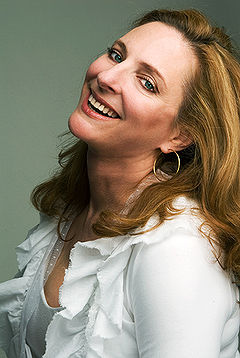

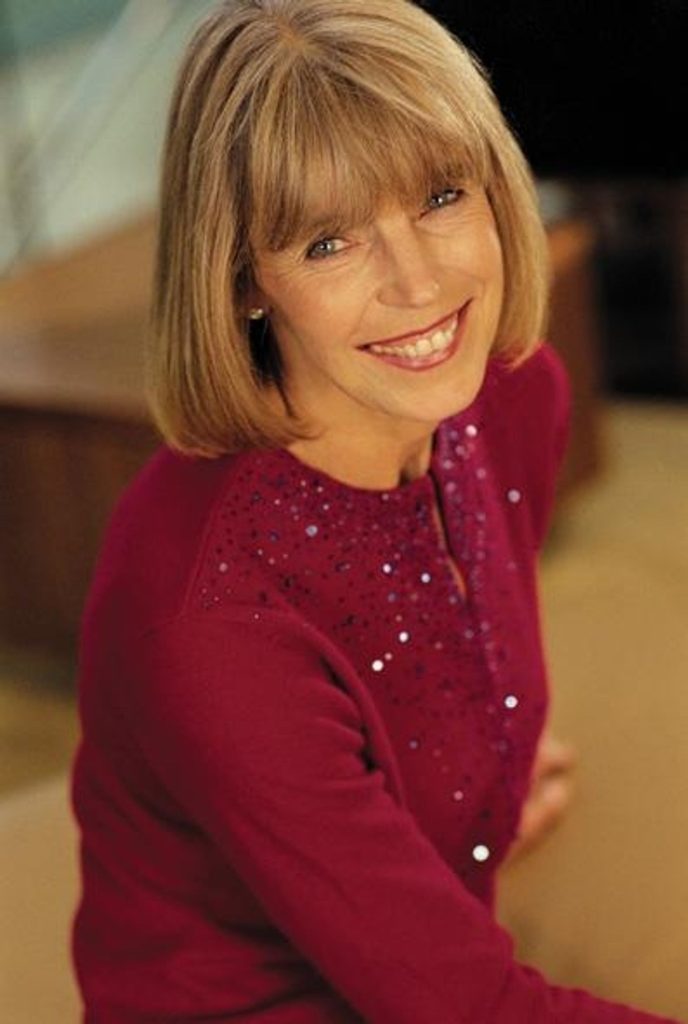

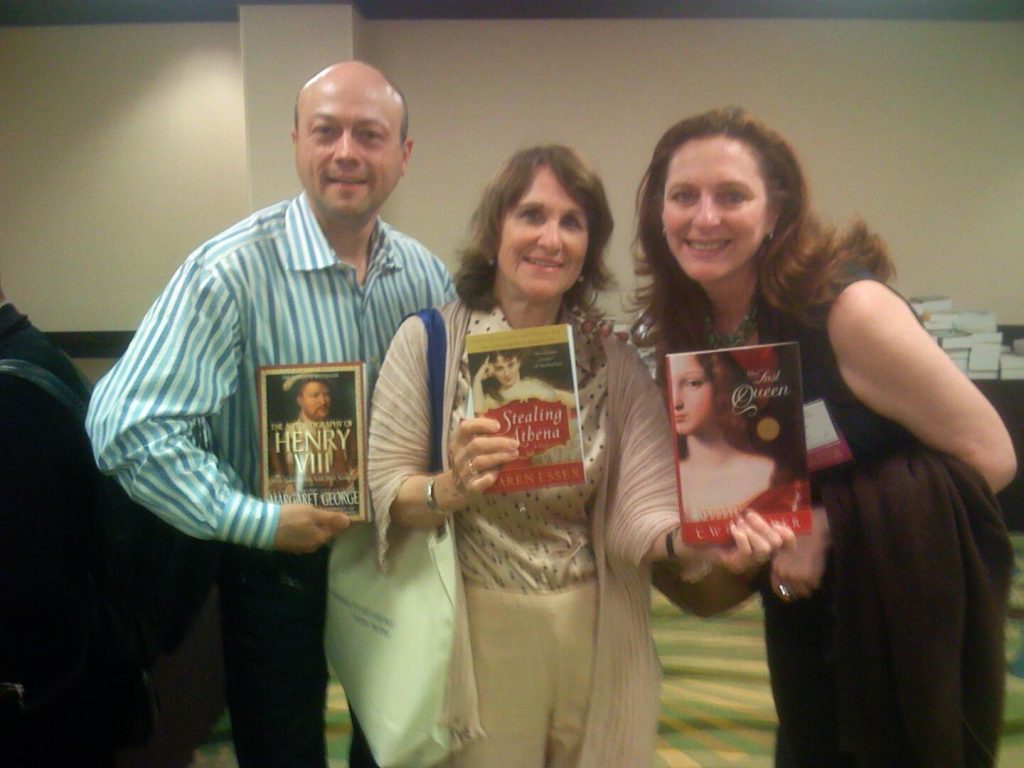







 KE: Hundreds. I mean, it’s extraordinary how many times that you can over a sentence, and find ways to make it better, or more specific, clearer, a better image comes to you. You realize that the grammar is all wrong, and then you realize you don’t need the sentence, and then you continue on, and then you realize that sentence is missing and you have to put it back, and reintegrate it. So it’s just—you know, it’s a very painstaking process.
KE: Hundreds. I mean, it’s extraordinary how many times that you can over a sentence, and find ways to make it better, or more specific, clearer, a better image comes to you. You realize that the grammar is all wrong, and then you realize you don’t need the sentence, and then you continue on, and then you realize that sentence is missing and you have to put it back, and reintegrate it. So it’s just—you know, it’s a very painstaking process.

 I’m pleased to announce that the paperback edition of Stealing Athena,(with a saucy new cover) will be available wherever books are sold on April 28th. I will be returning to the States from London to tour in May and June, so please check in with the website for the dates and locations, and please do come out and see me. If we’ve never met, please introduce yourself!
I’m pleased to announce that the paperback edition of Stealing Athena,(with a saucy new cover) will be available wherever books are sold on April 28th. I will be returning to the States from London to tour in May and June, so please check in with the website for the dates and locations, and please do come out and see me. If we’ve never met, please introduce yourself!
